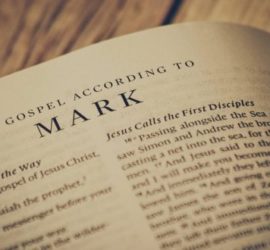Unit Theme:
Scriptures Difficult to Understand
The Bible is God’s Word to us, but in order for the Bible to fulfil its purposes in our lives, we must understand it. Therefore, we believe God gave us His Word in an understandable and clear form. Scholars call this concept the “clarity of Scripture.” This means the message of the Bible is not a puzzle we must piece together or a secret mystery we must solve. It is written in normal human language, using words, grammar, and literary standards with their straightforward meanings.
We should read the Bible naturally, and we should interpret its words as we would in ordinary daily use. That is, we should not seek out some new mystical, hidden, or secret interpretation. The message of the Bible is not hidden; it is available to ordinary people (Deut. 30:11-14). False teachers often claim to have secret knowledge, and they deceive their followers and create a false religion. The apostle Paul warns us against these false teachers who disseminate the “doctrines of demons” (1 Tim. 4:1 NKJV).
Although we affirm the clarity of Scripture, we also admit that many passages of Scripture are difficult to understand. However, our difficulty in understanding those passages is not due to any fault of the Bible itself. Instead, our struggles to understand are caused by the great distance that exists between us and the Biblical world. We live in modern times, but the Bible was written in ancient times. This distance between the ancient world and the modern world creates several barriers that hinder our understanding of the Bible. The barriers include language, worldview, culture, geography, and tradition.
The Bible was written in the Hebrew, Aramaic, and Greek languages, which have unique words and terms that do not translate well into English. Also, the ancient worldview was very different from the modern worldview. For example, ancient people did not separate the physical dimension from the spiritual dimension. Differences in culture relate to almost every part of life. Over the centuries, almost every category of culture has seen radical changes, including daily habits, political structures, religious customs, family relationships, educational patterns, work environments, and social traditions.
The geography of the Middle East is unfamiliar to most of us, but it plays an essential role in many Biblical events. Finally, in regard to tradition, Jesus declared that the Pharisees and scribes made the “word of God of none effect through [their] tradition” (Mark 7:13). Therefore, we sometimes misunderstand Scripture because of incorrect teaching in the past.
Over the next few weeks, we will see how these barriers to communication can be overcome or at least minimized. This week, in our attempt to understand three separate Biblical passages, we will learn about two unfamiliar ancient rituals; and we will reflect on our traditional view of God.
March 7, 2021 (Lesson 1)
DIFFICULT PASSAGES IN GENESIS AND EXODUS
1. Supernatural Experience (Genesis 15:7-18)
2. Dangerous Omission (Exodus 4:19-26)
3. Forbidden Vision (Exodus 33:11-23)
March 14, 2021 (Lesson 2)
WARS OF EXTERMINATION
1. Mandate for Such Wars (Deuteronomy 7:1-6, 16; 20:16-18;
25:17-19; 1 Samuel 15:1-3)
2. Execution of Such Wars (Numbers 31:1-2, 7, 9, 15-20; Joshua 6:1-2, 17, 20-21; Judges 1:28; 2:1-5)
3. A Christian Perspective (Matthew 24:6-8; 28:19-20; Romans 12:18; Ephesians 6:11-13; 2 Timothy 2:1-4)
March 21, 2021 (Lesson 3)
IMPRECATORY PSALMS: SEEKING JUSTICE
1. A Captivity Psalm (Psalm 137:1-9)
2. Prayers for God’s Vengeance (Deuteronomy 32:35, 41, 43; Romans 12:19; Hebrews 10:30; Psalms 69:22-28; 109:6-20)
3. Old Testament Morality (Exodus 23:4-5; Leviticus 19:14-18; Proverbs 24:17; 25:21-22)
March 28, 2021 (Lesson 4)
PUZZLING SAYINGS OF JESUS
1. The Shrewd Steward (Luke 16:1-9)
2. Turning the Other Cheek (Matthew 5:39; John 18:19-23; Acts 23:1-5; Romans 13:1-4; 1 Peter 2:13-14)
3. This Generation Shall Not Pass (Matthew 24:29-35; Mark 13:24-31; Luke 21:31-33)
April 4, 2021 (Lesson 5)
THE RISEN CHRIST (Easter)
1. Christ’s Burial (Matthew 27:57-66)
2. Christ’s Resurrection (Matthew 28:1-10)
3. Christ’s Mandate (Matthew 28:16-20)
April 11, 2021 (Lesson 6)
DIFFICULT NEW TESTAMENT PASSAGES
1. What Is Divine Election? (Romans 9:9-18; 1 Peter 1:2;
2 Peter 1:10-11)
2. Who/What Restrains the Antichrist? (2 Thessalonians 2:1-10)
3. Can Defectors Be Saved? (Hebrews 6:1-8; 10:26-27;
Romans 10:9-11)
April 18, 2021 (Lesson 7)
MYSTERIES IN THE REVELATION
1. The Seven Spirits of God (Revelation 1:4-5; 3:1; 4:5; 5:6; Isaiah 11:1-2)
2. Numbers in The Revelation (Revelation 1:10-13, 16, 20; 5:1; 8:2; 15:1; 16:1; 4:2, 4, 6-11; 14:1; 12:1-9; 13:1, 4)
3. The Mark of the Beast (Revelation 13:1, 16-18; 14:9-11; 15:2; 16:2)




